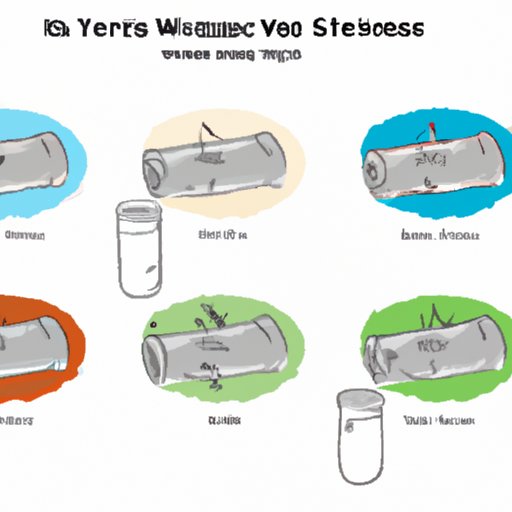
I. Introduction
If you’re experiencing chest pain or having trouble breathing, your doctor may recommend a chemical stress test to determine if you have an underlying heart condition. A stress test is a common procedure that evaluates the function of your heart and how well it performs under pressure.
In this article, we’ll explore everything you need to know about a chemical stress test – from what it is, its connection to heart health, the procedure, and its importance in diagnosing heart conditions. We’ll also discuss the different types of stress tests, how to prepare for the test, and the potential risks and side effects to watch out for.
Whether you’re scheduled for a chemical stress test or curious about the procedure, this guide is for you.
II. Explaining What a Chemical Stress Test Is: A Comprehensive Guide
A chemical stress test is a non-invasive procedure that evaluates the function of your heart through the use of medication. During the test, you’ll receive a medication that simulates the effect of exercise on your body while monitoring your heart rate, blood pressure, and how well your heart responds to stress.
Compared to other types of stress tests, such as an exercise stress test or cardiac catheterization, a chemical stress test involves less physical exertion and is considered safer and less invasive. The test is often used as a diagnostic tool to determine if you have an underlying heart condition or disease.
The test is typically recommended for individuals who have symptoms of heart disease, including chest pain, shortness of breath, or an irregular heartbeat, or for those who have risk factors such as high blood pressure, high cholesterol levels, and a family history of heart disease.
III. The Connection Between a Chemical Stress Test and Heart Health
During a chemical stress test, the medication used will cause your heart to beat faster and harder than normal, which will increase the demand for blood flow and oxygen. By monitoring your heart’s response to stress, your doctor can determine if your heart is functioning normally or if there are any potential issues that need further investigation.
The test also helps your doctor diagnose heart conditions such as coronary artery disease, heart valve disease, and heart failure. Stress is known to be a contributing factor in heart disease, and the test can help identify any underlying issues before they progress.
IV. What Happens During a Chemical Stress Test: Everything You Need to Know
Before the test, you’ll need to avoid food and drinks for several hours to ensure accurate results. Your doctor will also ask you about your medical history and any medications or supplements you’re taking.
The medication will be administered through an IV, and you’ll be closely monitored throughout the procedure. The medication will cause your heart rate to increase, and you may experience symptoms such as sweating, flushing, and chest discomfort.
The test will take around 1-2 hours to complete, and you should be able to resume your normal activities afterward. Your doctor will review the results and discuss the findings with you at a follow-up appointment.
Like any medical procedure, there are potential risks and side effects. These may include chest pain and discomfort, dizziness or lightheadedness, and difficulty breathing. Your doctor will closely monitor you throughout the test and address any concerns you may have.
V. The Importance of a Chemical Stress Test in Diagnosing Heart Conditions
A chemical stress test is an essential diagnostic tool for identifying underlying heart conditions. If left undiagnosed, these conditions can lead to more severe health problems such as a heart attack or stroke.
The test can diagnose a range of heart conditions, including coronary artery disease, heart valve disease, and heart failure. Early detection is crucial in managing heart health, and the test can help your doctor develop an appropriate treatment plan that will improve your heart function and overall well-being.

VI. Understanding the Different Types of Chemical Stress Tests
There are two types of chemical stress tests: pharmacologic and exercise stress tests. A pharmacologic stress test involves the use of medication to simulate the effect of exercise on your heart, while an exercise stress test involves physical activity such as walking on a treadmill.
The test chosen will depend on your overall health and ability to exercise. If you’re unable to perform physical activity, a pharmacological test may be the recommended option. Exercise stress tests may be recommended for those who are physically able to perform the activity.
VII. Preparing for a Chemical Stress Test: Tips and Guidelines
Before the test, your doctor will provide you with specific instructions to follow. These may include avoiding food and drinks for several hours before the test, avoiding caffeine, and not taking certain medications. Be sure to follow these guidelines to ensure accurate results.
You should also wear comfortable clothing and shoes for the test as you may be walking or performing physical activity. It’s important to stay hydrated, but make sure to avoid excessive fluids as it may interfere with the test.
If you have any questions or concerns about the test, don’t hesitate to ask your doctor. They can address any concerns you may have and provide you with additional information and support.
VIII. Conclusion
A chemical stress test is an essential diagnostic tool for identifying underlying heart conditions and ensuring optimal heart health. If you’re experiencing symptoms of heart disease or have risk factors, it’s important to prioritize your heart health and seek medical attention. By understanding the procedure, preparing for the test, and following your doctor’s instructions, you can improve your heart function and overall well-being.
At the end of the day, your heart health is in your hands. Don’t wait until it’s too late to take charge. Schedule a chemical stress test today and start prioritizing your heart health today.





